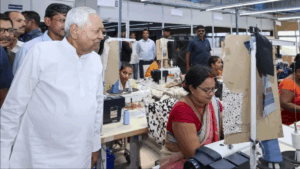GS2 – Governance

Context:
Bihar CM Nitish Kumar has declared that future teacher recruitment exams will prioritise domicile candidates, following a 35% reservation for Bihar-native women in state jobs (July 2025).
Rationale & Advantages:
- Employment Boost: Targets local youth and may reduce outward migration.
- Federal Assertion: Reinforces states’ capacity to tailor employment policies to local conditions.
- Replicable Model: Could influence similar moves in other states facing high unemployment.
Concerns & Constitutional Challenges:
- Exclusion of Talent: Non-domicile candidates may be unfairly restricted, impacting recruitment quality.
- Constitutional Provisions:
- Article 16(2): Prohibits discrimination in public employment based on place of birth or residence.
- Article 16(3): Permits Parliament (not state governments) to make exceptions for residence-based preferences.
- Judicial Precedents:
- Pradeep Jain v. Union of India (1984): Limited regional preference allowed in education, but blanket domicile-based job reservation ruled unconstitutional.
- SC reaffirmed India has only one domicile—the Domicile of India, not state-specific ones.
- Such reservations may also violate Articles 14, 15, and 19(1)(g).
Way Forward:
- Balanced Employment Strategy: Invest in skill-building, infrastructure, and administrative reforms alongside reservation policies.
- Constitutional Compliance: Ensure policies align with equality principles while addressing local needs.
- Long-Term Solutions: Link job policies to youth skill development and economic planning to reduce unemployment sustainably.




